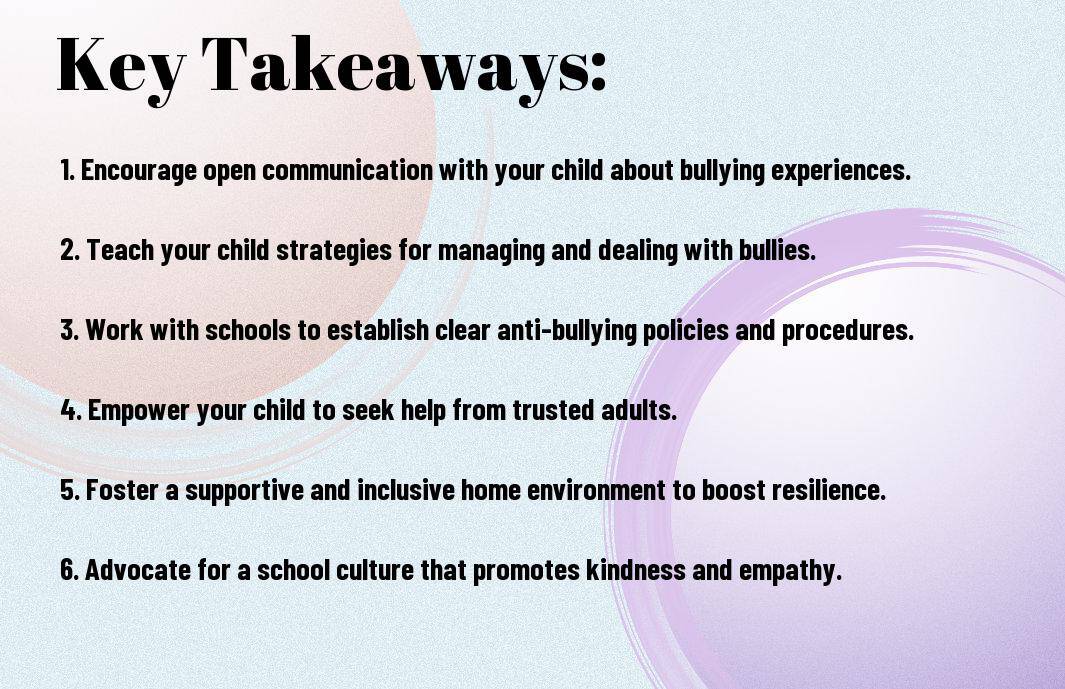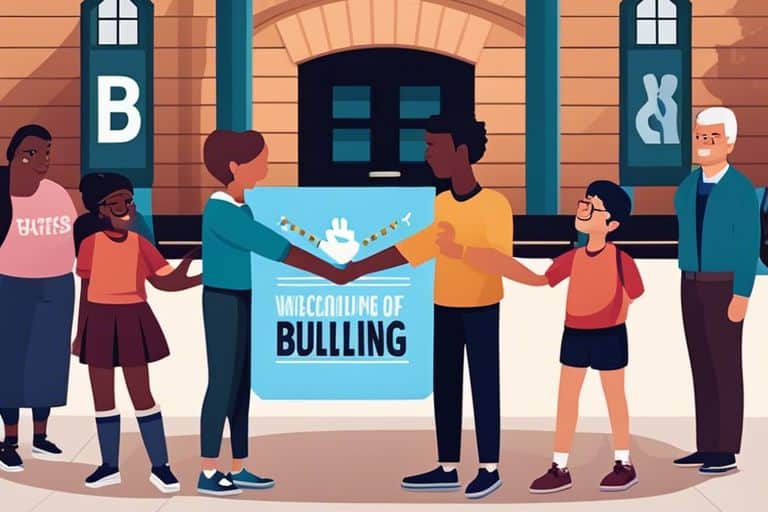In the contemporary era, dealing with bullying has become an increasingly significant concern for parents and schools alike. Bullying can have detrimental effects on a child’s mental and emotional well-being, and addressing this issue effectively requires a multifaceted approach. It is vital for parents and educators to empower their children with the necessary tools to navigate through these challenging situations and work cohesively with schools to create a safe and supportive environment. To help you in this empowering journey, here are 12 Ways to Empower Your Child Against Bullying. Let’s delve into the strategies and insights that can make a real difference in facing this pressing issue head-on.
Key Takeaways:
- Open communication: Encourage your child to openly communicate about any bullying experiences they may encounter. Keep the lines of communication open with your child and their teachers.
- Empower your child: Teach your child to stand up for themselves and seek help when needed. Provide them with the confidence and skills to handle bullying situations effectively.
- Work with schools: Collaborate with the school to address bullying effectively. Advocate for anti-bullying policies and procedures, and support teachers and staff in creating a safe and inclusive environment for all students.

Recognizing Signs of Bullying
It is crucial for parents and educators to be able to recognise the signs of bullying in children. Being aware of the indicators will aid in early intervention and support for the child.
Physical and Emotional Indicators
Children who are being bullied may show physical signs such as unexplained bruises, cuts, or scratches. They may also experience frequent headaches or stomach aches. Emotionally, they may exhibit signs of anxiety, fear, or withdrawal. It is essential to observe any changes in their behaviour and take note of any physical marks on their body.
Changes in Behaviour and Performance
Another key indication of bullying is a noticeable change in a child’s behaviour or performance at school. This might include sudden withdrawal from activities they once enjoyed, a decline in academic grades, or reluctance to attend school. Parents and teachers should monitor any significant shifts in behaviour and reach out to the child to offer support.
It is important to remember that these changes can also be caused by other factors, but it is crucial to take them seriously and address them with the child to ensure their well-being.
Empowering Your Child
Bullying can have a significant impact on a child’s confidence and self-esteem. Empowering your child to deal with bullying is crucial in helping them overcome the negative effects. By providing them with the right tools and support, you can help build their resilience and equip them with the skills to handle challenging situations.
Building Confidence and Resilience
Encouraging your child to focus on their strengths and achievements can help boost their confidence. Positive affirmations and praise for their accomplishments can reinforce their self-worth. Additionally, promoting resilience by teaching them to bounce back from setbacks and challenges is essential. You can achieve this by encouraging them to develop problem-solving skills and to view obstacles as learning opportunities.
Communication Strategies and Assertiveness Training
Teaching your child effective communication strategies and assertiveness skills can be incredibly empowering. Role-playing different scenarios can help them practice standing up for themselves assertively and expressing their feelings. Empower your child by teaching them to use “I” statements to effectively communicate their thoughts and emotions. This will equip them with the tools to assert themselves confidently and respectfully in challenging situations.
It’s important to teach your child that it’s okay to seek help from a trusted adult when they’re experiencing bullying. Additionally, promoting open communication and assertiveness training can help them navigate peer relationships and handle conflicts effectively.

Collaborating with Schools
Navigating School Policies on Bullying
When dealing with bullying, it’s important to familiarise yourself with the school’s policies and procedures regarding bullying. These policies should outline the steps to be taken when a bullying incident occurs, as well as the support available to both the victim and the bully. It’s vital to understand and adhere to these policies to ensure that your child receives the necessary support and that the bully faces appropriate consequences.
Effective Communication with Educators
Communication with your child’s educators is key to addressing bullying effectively. It’s essential to establish an open and supportive line of communication with teachers and school staff. This can involve discussing any bullying incidents that have occurred, as well as collaborating on strategies to support your child and prevent future incidents. By working together, you can ensure that your child’s needs are being met and that the school is taking the necessary steps to address the issue.
Effective communication with educators can make a significant difference in how bullying situations are handled. It’s important to approach these conversations with a clear understanding of the situation and a willingness to work together towards a solution. By maintaining a positive and proactive approach, you can empower your child and work with the school to create a safer environment for all students.

Prevention and Intervention
When it comes to dealing with bullying, prevention and intervention are key factors in addressing the issue. It is important for parents and schools to work together to create a safe environment for children, as well as provide support and resources for those who are affected by bullying.
Creating a Safe Environment at Home
It’s crucial for parents to create a safe and open environment at home where their children feel comfortable discussing any issues they may be facing, including bullying. Encouraging open communication and maintaining a supportive atmosphere can help children feel empowered to speak up about their experiences and seek help if needed. Setting clear expectations of behaviour and firmly addressing any form of bullying can also help prevent such incidents from occurring.
Community Resources and Support Networks
Community resources and support networks play a significant role in providing assistance to both children and parents dealing with bullying. Whether it’s local support groups, helplines, or online communities, these resources can offer guidance, advice, and emotional support to those affected by bullying. It’s important for parents to be aware of the available resources and encourage their children to reach out for help when necessary.
Additional information about community resources and support networks, including helplines, online forums, and local support groups, will be provided in the following sections to ensure that parents and children have access to the necessary support and guidance.
Dealing with Bullying – Empowering Your Child and Working with Schools
It is crucial for parents to empower their children against bullying and work with schools to create a safe and supportive environment. By providing your child with the necessary tools to handle bullying, such as self-confidence and assertiveness, you can help them navigate through challenging situations with resilience. Additionally, collaborating with schools to implement anti-bullying policies and interventions can create a culture of respect and acceptance. For more information on how to empower your child against bullying, including cyberbullying, visit How to Empower Your Child Against Bullying.
FAQ
Q: What is bullying?
A: Bullying is deliberate, repeated and aggressive behaviour intended to harm, intimidate or exclude others.
Q: How can I tell if my child is being bullied?
A: Look out for signs such as unexplained injuries, changes in behaviour, or reluctance to go to school.
Q: What should I do if my child is being bullied?
A: Support your child, listen to their concerns, and report the bullying to the school. Encourage open communication and seek professional help if needed.
Q: How can I empower my child to deal with bullying?
A: Teach them assertiveness, build their self-esteem, and help them develop coping strategies such as walking away or seeking help from a trusted adult.
Q: How can I work with the school to address bullying?
A: Communicate with the school, attend meetings with teachers and administrators, and collaborate on developing anti-bullying policies and interventions.
Q: What legal protections exist for my child against bullying?
A: Schools have a legal duty of care to protect students from bullying, and there are laws and policies in place to address bullying behaviour within educational settings.
Q: How can I support other children who are being bullied?
A: Encourage empathy, teach inclusivity, and advocate for a positive and respectful school culture that does not tolerate bullying.






